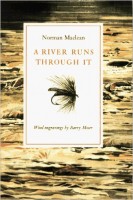 I’m off to a literary festival, so, to satisfy the insurers of the media organisation that’s commissioned me, I’ve had to fill in a risk assessment. Well, it is a literary festival dedicated to the work of Norman Maclean, who spent half his life teaching literature in Chicago and the other half fishing the rivers of his native Montana. If I’m to go where he went in Montana, and maybe have a cackhanded go at doing what he did on the Blackfoot river, there’s a danger of tripping up and falling in.
I’m off to a literary festival, so, to satisfy the insurers of the media organisation that’s commissioned me, I’ve had to fill in a risk assessment. Well, it is a literary festival dedicated to the work of Norman Maclean, who spent half his life teaching literature in Chicago and the other half fishing the rivers of his native Montana. If I’m to go where he went in Montana, and maybe have a cackhanded go at doing what he did on the Blackfoot river, there’s a danger of tripping up and falling in.
Maclean published only two books. The first, A River Runs through It and Other Stories, appeared in 1976, after he had retired from the University of Chicago after 45 years. It’s a slim book with a global reputation, one enhanced by Robert Redford’s sensitive film adaptation of the leading story, which was released after Maclean’s death in 1990. That story, which combines fishing and family tragedy, has one of the most memorable opening sentences in modern American literature: “In our family, there was no clear line between religion and fly fishing.”
The second book, Young Men and Fire, published posthumously, is a non-fiction account of a wildfire that killed 13 of 16 wild-land firefighters in Mann Gulch, Montana, in 1949. Maclean — who had served time in the forest service and experienced fires himself — spent a decade researching and writing it, and had still not finished it to his satisfaction when he died.
I first came across Maclean’s work in the 1990s. I was editing the “outdoors” pages of the Weekend section in The Daily Telegraph, and our fishing columnist was the writer David Profumo. When A River Runs through It was published in Britain, David wrote the introduction for the paperback. “Readers who make a habit of pressing books on other people can be a tedious race, but I’m going to take my chances,” he wrote. “‘The moment you praise a book too highly,’ warned Henry Miller, ‘you awaken resistance in your listener’ — but since A River Runs through It has become one of my favourite works of modern literature, it seems worth blowing the trumpets. I only wish I’d written it myself.” I was equally taken with it, and, like David, pressed it on lots of other people. Here I am doing it again.
Fishing and fire, two of Maclean’s great preoccupations, will be addressed during the festival, which includes contributions from his son, the writer John Maclean, those who helped with research in Mann Gulch, and scholars and reviewers. Among the latter will be Pete Dexter, author of novels including Paris Trout, who said that A River Runs through It was “the finest writing to come out of anyone’s typewriter since I started reading”. (Dexter’s profile of Maclean, written for Esquire in 1981, is also pretty fine.)
During the festival there will be a hike for the hardiest to Mann Gulch and visits to several of Maclean’s favourite fishing holes. Some of them — partly thanks to his writing — will be busier than they used to be. In a letter to a friend in 1976, he wrote of the Big Blackfoot: “…there are so damn many fishermen on it now you have to bring your own rock with you.”
As well as returning to A River Runs through It, I’ve been briefing myself with the excellent The Norman Maclean Reader, edited by O Alan Weltzien, who will be speaking at the festival. In one of the letters Weltzien includes, Maclean tells how his written stories emerged from the ones he used to tell his children and his western pals. “Even your children or your pals aren’t going to listen to you for more than 10 or 15 minutes, so there is great premium on deletion, and especially of all scenery. Besides, they know the scenery. All you have to say is ‘the Blackfoot river’.”
How, then, did Maclean manage to transport me, and so many others who have yet to see that scenery, all the way to Montana? I’m reminded of advice a writer friend of mine was given by the great London publisher Jock Murray: “Cut, and an echo of what you have cut will remain.”

Leave a Reply